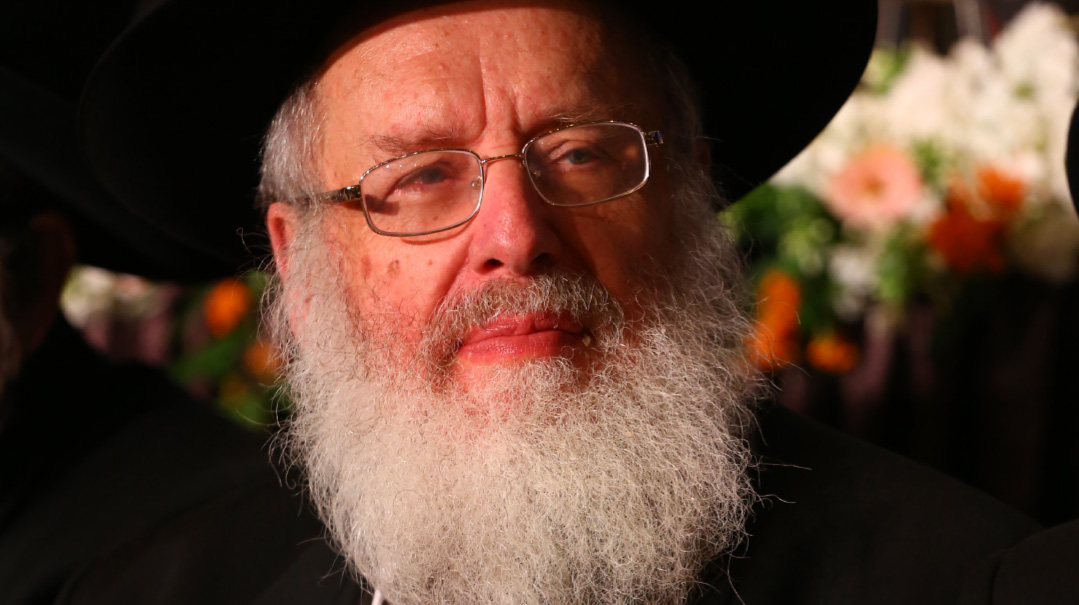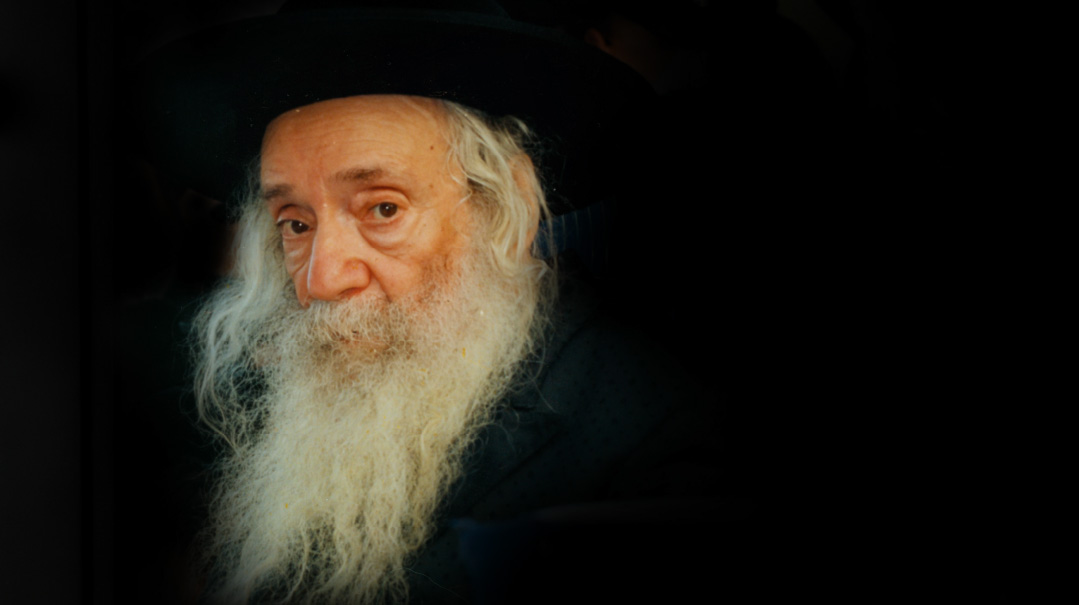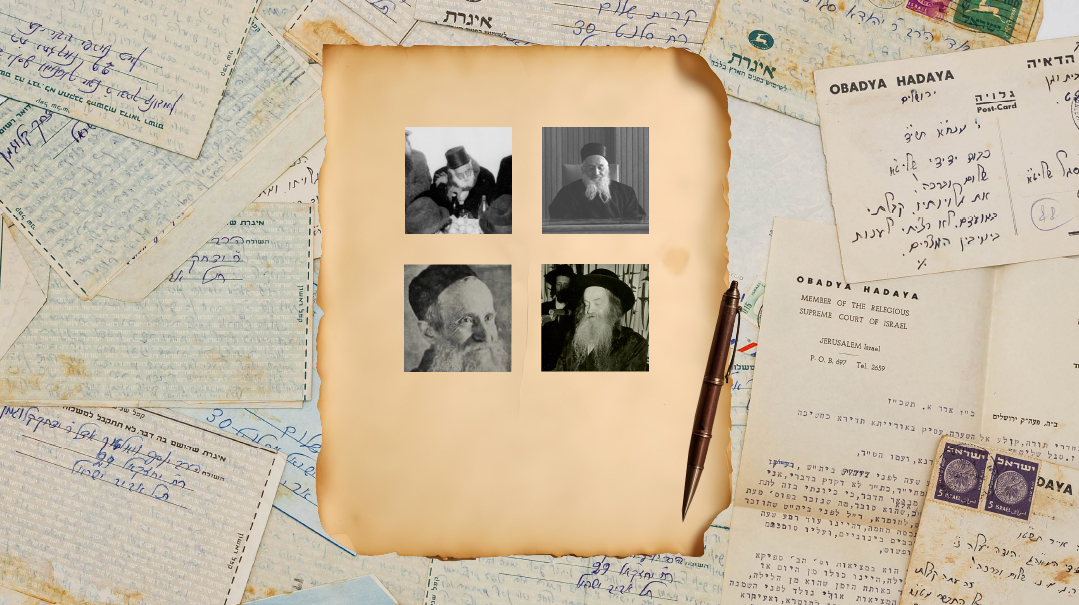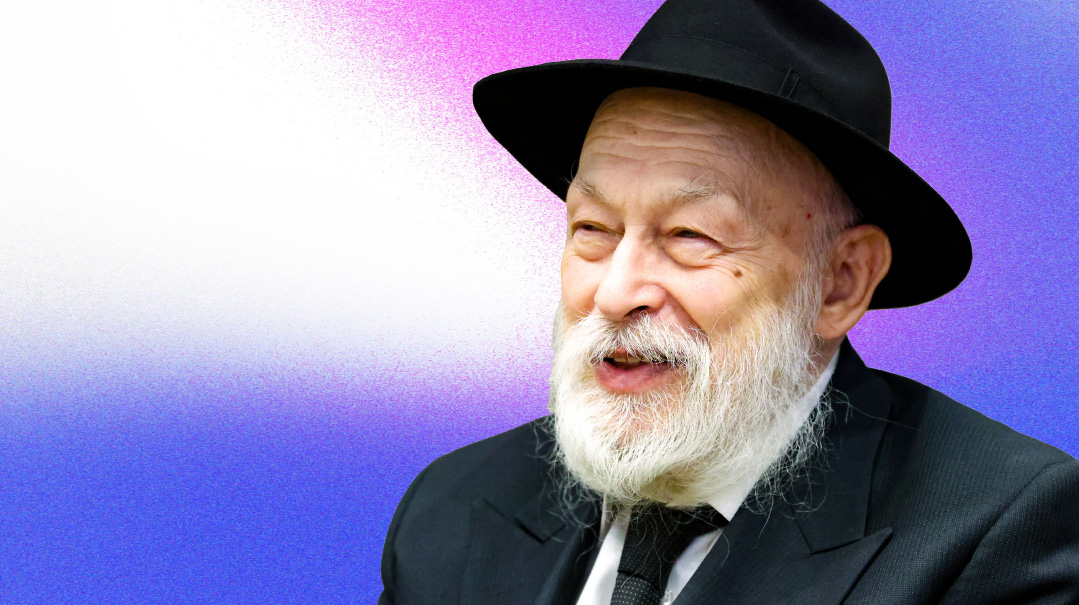From the Glitter to the Gold
| December 12, 2023After leaving Hollywood behind, Ari and Nes Blau want you to know exactly what you're not missing
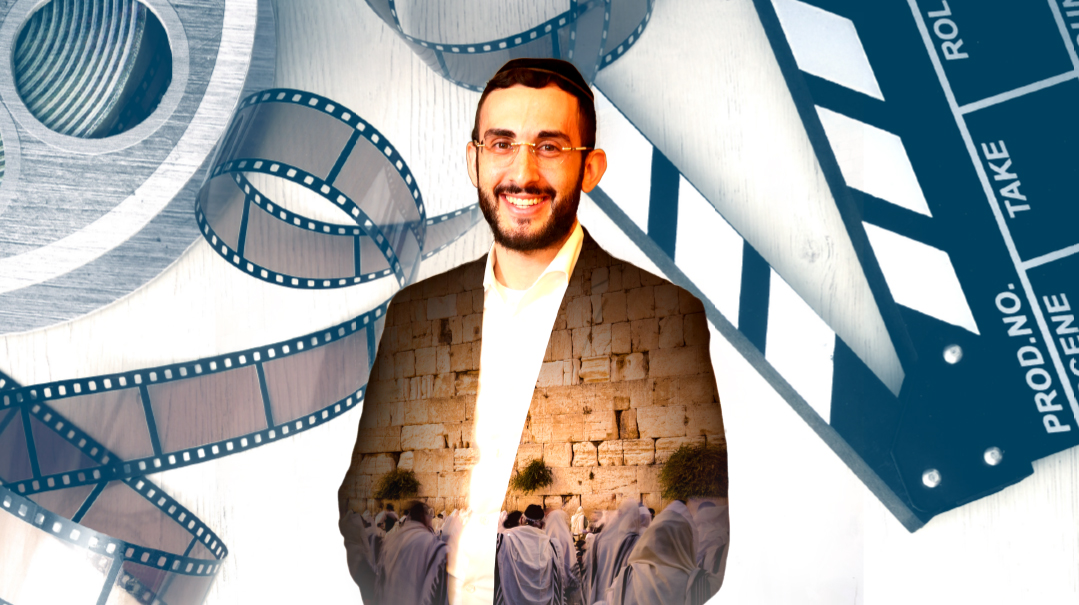
Six years ago, Ari and Nes Blau were on a successful Hollywood trajectory – he as a late-night comedy writer and she as an up-and-coming actress. Today, raising a Torah family in Jerusalem, they have straight-talk answers to a questioning generation whose senses are flooded with messages from an industry with a subtle yet overarching agenda
There’s a lot to like about Ari and Nes Blau.
They both have a sort of quiet conviction and confidence that you don’t find too often these days, which is even more impressive considering they’re both quite comfortable with being in the public eye. There’s no bluster, no showmanship, just a real clarity about the lives they’ve chosen to lead.
As Mishpacha detailed in “Their Big Break” (Barbara Bensoussan, Issue 753), when they first met, the Blaus were a Hollywood couple. Nes was an actress, featured in TV shows and movies, and Ari was a writer/producer on CBS’s The Late Late Show with James Corden. But in 2017, they left their names in lights behind for the world of Torah.
They never looked back.
After they left Hollywood, the Blaus moved to Israel. Ari learned for two years at Machon Shlomo in Har Nof, after which he started learning in Rav Yosef Elefant’s shiur in the Mir Yeshiva in Jerusalem. He recently started teaching Gemara at Aish HaTorah in the Old City.
A couple of years later, the Blaus started sharing their story. People reached out with their own struggles, asking about meaningful connection to frumkeit in a world bombarded with media. One particular letter they received was from a young Bais Yaakov girl who had been going through a difficult time. She got her hands on a laptop and started obsessing over inappropriate movies and TV shows.
“I dream of working in Hollywood,” she had written. “My parents don’t know I’m living a double life.”
She’d grown depressed, and life was getting harder for her, to the point that she considered harming herself. And that was the very week that the article about the Blaus was published. It shook her up, as she realized that two people who had everything she wanted just walked away from it — running toward the life she was born into.
If they can walk away from the life I’m dreaming about, she thought, it can’t be everything I’m dreaming it is.
For the Blaus, this letter struck a particular chord.
“We thought maybe the modern Orthodox, the secular, kiruv-type crowd would be interested in what we’re talking about. Then we realized there’s so much going on, even in the heart of the yeshivish world,” Ari says, explaining that even though the frum world has tried to shelter itself as much as possible, things aren’t what they used to be. “With technology and the easy access, things have changed. Seven, ten years ago, you had to work a lot harder to watch and see, but today, kids are getting their hands on the internet on phones. People see it. And it can’t not have an effect on you, whether it’s the acting, music, or even the celebrity sports world.”
Over the past few years, the Blaus have been speaking all over the world in yeshivos, seminaries, camps, and community events, to a wide range of people. Here are the top five questions their audiences ask.
Why can’t I live a party life and a Torah life?
Typically asked by: yeshivah bochurim
When Ari speaks in yeshivos, most boys love to hear his story, to connect with the guy that used to write comedy for a network show and is now learning in the Mir.
He sees a pattern of questions that troubles him, mostly from in-town boys who grew up with a yeshivah foundation.
“Guys come up to me after and ask, ‘How can I live the party life and Torah life? Why can’t I do both?’”
The first time he was asked that, Ari said, “No” — period. Then he asked the bochur to define what he meant.
“You know I have a background working in Hollywood. I’m very visual. Please explain the details of this party life,” Ari responded with a touch of sarcasm.
“You know — get out of yeshivah, get a few nursing homes, go on trips with the boys to India and Africa, Pesach programs, you know,” the boy said.
“Interesting, do they just hand you nursing homes when you get out of yeshivah?” Ari deadpanned. Then he added, “And what does the Torah life look like?”
“Wake up early, daven neitz, give an iyun daf yomi shiur, you know…” the boy said.
Well. That gave Ari a pause, because the bochurim’s definition of partying is completely different than that of the outside world. In Hollywood, the party life consists of heavy drug and alcohol abuse, among other hedonistic pursuits. The bochurim asking Ari about partying aren’t referring to that.
“It’s actually good that their concept of the party life is how they describe it,” Ari comments. “Maybe they’re asking these things to their rebbeim also, but I think they’re asking me because they think I lived the party life,” he muses, even though the old Ari never messed with drugs or alcohol.
But this question does make it clear that these bochurim want to be rich and have fun without the burden of a real Torah life. To Ari, who is learning in the Mir and has a chavrusashaft at night with Rav Dovid Kamenetsky, the son of Rav Shmuel Kamenetsky, this is bewildering. The life he chose is so much more meaningful, and yes, even more fun than his old life ever was.
“Impossible,” he responded to the boy who asked him the question. “They can’t coexist — we weren’t created just to seek the pleasures of this world, the Mesillas Yesharim explains this: “Sheha’adam lo nivra elah l’hisaneg al Hashem.” That doesn’t mean you can’t enjoy physical things. Of course you can. And you should — we’re here to be mekadesh the physical world. But Torah always has to be the ikar, and it can’t coexist with a pleasure-seeking-only lifestyle.”
While Ari is relieved that bochurim’s examples of partying aren’t close to the craziness that goes on in Hollywood, the truth-seeker in him is still bothered that the pull is so strong.
“Yeridas hadoros is inevitable. You need to consider what your future family will look like and set yourself up with the best possible foundation of real Torah values. And if you want a life of ‘fun,’ I mamash can’t think of anything more fun than Eilu Ne’aros,” he says, referencing a perek in Maseches Kesubos.
Still, Ari knows it’s good the bochurim are asking; the desire to have a foot in both worlds shows they have a desire for a connection to Torah. That’s the connection he and his wife are trying to strengthen — to fix today’s misconceptions so they don’t get even more skewed in future generations.
What’s so bad about a clean movie?
Typically asked by: mainstream, young- adult women
Ari and Nes never tell people to completely abstain from secular entertainment straight up — “I would never tell people what to do,” Nes says — but it’s clear from their life story that they aren’t proponents of the material Hollywood churns out, to say the least.
Recently, Ari and Nes gave a talk to young- adult women. Their audience understood why the Blaus chose to stop working in Hollywood, but they wanted to know, “What‘s so bad about watching a clean movie every now and then?”
There are many ways to approach this question, Ari explains. One of the main issues is the subliminal messaging that is pervasive in all Hollywood content.
“Don’t kid yourself that you aren’t going to be brainwashed by these things,” he says flatly. “Whether it’s watching a romantic comedy and getting the wrong idea of what a relationship should look like, or thinking that a family depicted on screen is what a normal family dynamic should be, how spouses resolve fights, what are normal issues you’ll deal with as an adult and the tools you’ll need to resolve the plot conflict — it’s all fake. Every movie and every TV show has conflict and resolution. And if you’re seeing those resolutions coming from a value system that is wholly unconnected from Torah, it can start to penetrate. Even if the stories are fiction or fantasy to the point where you don’t associate them with reality at all, there are still hidden messages and agendas,” Ari says. “You’re a Yid who’s getting your values from Hollywood and not the Torah.”
Nes adds that she knows people need to relax after a stressful day, but to her, it’s clear watching a “harmless” movie is not the way to go.
“Our environment has a hashpa’ah on us. When you go on autopilot and watch a movie, that’s also going to affect you at some level,” she says — because zoning out in front of a show will inevitably do just that.
“I used to be a crazy hard-core binge watcher,” Nes remembers. “But when I envisioned what type of home I wanted and what type of children I wanted, I realized there were things that I saw in movies and TV shows that I did not want my future children to ever see or try to emulate. How much of a hypocrite would I be to say that it’s okay only for me because it doesn’t affect me, when that’s clearly a lie? I wouldn’t be comfortable building the foundation of my home like this.”
And even more than for her future children, Nes wondered about herself.
“When you become more religious you start to question things — and I questioned a lot,” she explains. “What is the objective of these shows I’m watching? Why am I so invested?” Eventually, Nes cut down on the shows she watched until she stopped altogether.
When they’re asked this question, Ari makes it a point to expand on the topic, because these days, it’s not just movies and TV shows. Think about it: A friend sends you a funny link on TikTok or YouTube, and the autoplay continues with something you hadn’t bargained for.
“In 2012 I had a YouTube channel and was making videos that were getting millions of views,” says Ari. “It’s a free platform, open to anyone who has a camera and wants to share their content.”
Accessibility to these platforms is so easy now. You don’t need a subscription or a movie ticket, you don’t even need to go anywhere to watch hours of nonsense.
“Even if you have no intention to hear unfiltered language or inappropriate content, it’s there, and even the innocent stuff is pollution in your brain,” Ari says, explaining that although mindless clip-watching is not two hours of Hollywood production, it’s just as bad, if not worse.
“Mesillas Yesharim describes this world as a prozdor — a hallway. Olam Hazeh is a hallway before Olam Haba. The content in these social media videos and pictures is the epitome of an Olam Hazeh vision. They have no significance whatsoever. Does the picture of your Aunt Karen drinking coffee really matter? Social media is built off of making nothing into something. People have to stop and think about the big picture,” Ari says. “It’s all katnus, it’s the prozdor life. There’s gadlus inside of you — you have to see it, and realize there’s something bigger.”
Why can’t i just be entertained?
Typically asked by: young adults who feel they’re savvy enough to parse out fiction from reality
When he started working in Hollywood, Ari’s mother flew out to visit. She came to The Late Late Show, and Ari took her backstage. He showed her the stage, the cameras, the audio equipment, the lights, the amount of people on staff, and the studio where they edit.
“I showed her everything,” Ari remembers. “The operation was a way bigger deal than she had thought — she was blown away. It wasn’t just the host and a cameraman operating a lone camera. And I began to realize just how many people who don’t work in the industry don’t know how much is fake and scripted. Which is: All of it. Even reality TV, which by definition the world thinks is reality, it’s all scripted. There’s an agenda and a message to everything that’s produced.”
That’s the first point the Blaus make when responding to this question: “All media has an agenda. Every movie, TV show, song, and ad is crafted in a way to send messages to the audience,” Ari says.
And while blatant marketing can be obvious — the camera pans over a car insignia, characters drink out of Coke bottles with the label facing the screen — Ari’s insider knowledge of the business makes it clear to him that it’s not just product placement. There are also countless subliminal messages to make you feel you’re lacking things in your life or you’ll be happy only if your life is like the one being portrayed.
“Even when it became political,” Ari shares. “In the preelection days, we were writing jokes about the election, and I remember asking the other writers why we couldn’t make fun of everybody? We’re a late-night comedy show, there’s enough to make fun of everybody in this race.” And the answer was told to him straight up: CBS allowed the writers to make fun only of Donald Trump.
Once Ari realized that every piece of media has an agenda, he realized that he was essentially a mouthpiece of that agenda.
“As much as I’m passionate about making people laugh — that’s why I wanted to be a famous comedian since I was a little boy — I realized there is a business side of things, and I have very little say. At the end of the day, the suits call the shots based on their agenda.”
It’s a message Ari heard time and time again from his rebbeim at Machon Shlomo. Things stick in your head, and of course, it goes without saying why inappropriate content is bad. But even seemingly innocuous material can influence you.
“Think of Disney movies,” says Nes. “The message of most Disney movies is you were born a certain way, and you won’t be happy until you become the opposite way. This is not a Torah hashkafah. When my husband and I were talking about what kind of kids we wanted to raise, what type of home we wanted, we went down the list of Disney movies we loved from our childhoods and tried to find one that’s not against Torah hashkafah. We couldn’t, so we agreed no Disney movies.”
Their kids are happy with a BBC documentary once in a while (“They know a lot about the iguanas on the Galapagos Islands,” jokes Ari).
Nes explains that there’s a big misconception in the world at large, not just in the frum world, because people think they’re just relaxing with something light and entertaining — but the reality is they’re not.
“There are millions of dollars on the line,” she says. “It’s a business based on views versus moral content.”
Why can’t you still work behind the scenes?
Typically asked by: people who think it’s worth putting up with the tripe for the paycheck
For Nes, her insider knowledge is more specific than just knowing that watching TV and movies is a waste of time and brain space. As an actress, she worked as a leading lady, so she had to go for roles with romantic storylines.
“My manager would tell me what I would be auditioning for and what I was allowed to wear to my auditions — I would have to show different options of what to wear to my male manager so he could pick the best one,” she says. “I started to really become uncomfortable with the lines I was auditioning with.”
When she dug into what was bothering her, Nes found Torah, and she had to reconcile many of the beliefs she thought were important. For example, Nes thought she was a feminist, but when she thought about how Hollywood treated women, she realized how off it all was.
“Women are objectified and then become obsolete in Hollywood,” Nes says. “If you are not in a certain age bracket, or you don’t look like you’re in that age bracket, you’re done, your career is over.”
For a few months, Nes thought she could make things work, even with her new path, by auditioning for only appropriate roles and wearing what she wanted, but it didn’t work that way. She realized how much Hollywood was trying to control her — and how ridiculous it all was, because those in the industry weren’t happy anyway, no matter how they looked onscreen. That’s when Nes decided to leave it all behind.
“I’d dreamed of becoming famous in Hollywood since I was eight years old. Instead, I lived my dream by leaving Hollywood behind.”
Then people started asking Ari why he, who was behind the scenes, needed to make the same clean break Nes did.
“We understand why your wife couldn’t be an actress in Hollywood,” people said. “But why can’t you still be a comedian working at late-night shows?”
To Ari, it was clear. Just like Nes didn’t get to pick what roles she would audition for because she had a manager making decisions for her, at CBS, he also had people above him instructing him about what type of content he had to write about. That entails researching the topic.
“You have to fill your brain with this inappropriate content,” Ari explains. “I worked for a show that came on air at 12:36 a.m. You can just imagine what type of comedy they were looking for.” Ari knew the environment wasn’t good for him, and at the end of the day, he knew he could do better. It was time to lay a real foundation in Torah.
The Blaus haven’t totally left their artistic pursuits or producing, though, but today they stay behind the camera. One fun creative outlet they’ve found is writing plays for girls’ schools together. With their filmmaking degrees and experience, the Blaus launched NesProductions, creating documentaries and fundraising materials for Jewish nonprofits. Nes, who also works as a photographer in Jerusalem, doesn’t even feel a real pull to act anymore — after years of pretending to be other people, she enjoys being herself.
How do you have such clarity about what you’re doing and where you’re headed?
Typically asked by: anyone and everyone
Ari was in America recently and he spoke in 12 places over the course of a week. This question — this topic — is what he was asked to speak about the most.
To the Blaus, the answer is obvious: “Aseh lecha rav.”
Ari expounds, “You need to have a rebbi — it’s a must — because you can’t have clarity in life without asking advice and speaking through sugyas with your rebbi who knows you and your family. We don’t always have clarity, but that’s what a rebbi is for.”
“A rebbi, not a posek,” Nes clarifies. “Someone who can help guide you and your family in moments where you don’t have clarity.”
As baalei teshuvah, the Blaus have had relationships with different rabbanim over the years, each of whom has played a crucial role in guiding them at the time. In Los Angeles, they consulted with Rabbis Alex Landa and Yisroel Majeski of the local kiruv organization LAJ. They’re also close with Rabbi Yona Klahr, the rosh kollel at Cherry Hill Kollel in New Jersey, who Ari met through a childhood friend who learned in Rabbi Klahr’s kollel.
“I was inspired when I saw the yungeleit of the kollel and the real makom Torah. I wanted that for myself and my future family,” Ari says. “Rabbi Klahr once told me that the longer I stay in yeshivah, the better the trajectory of my Yiddishkeit — and it will impact the type of family I’ll have. With his guidance, we’ve been able to continue to lay our Torah foundation here in Yerushalayim. It’s not an exaggeration to say that he saved our lives from what could have been, and he continues to guide us and treats us as if we are his own children.”
Once they moved to Israel, the Blaus got to know the Machon Shlomo rebbeim in Har Nof. After a couple of years, Rabbi Yehoshua Styne from Machon Shlomo recommended Ari learn in the Mir with Rabbi Elefant.
“In 2017, my wife and I were walking in Beis Yisrael during Succos. We passed by a building and I realized it was part of the Mir,” Ari remembers. It had big letters that said Beis Yeshaya. My wife took a picture of me standing in front of the building. I dreamed of what it would be like to learn there one day — and now I do. Rav Elefant is my rebbi, and I don’t ever take it for granted.”
He pauses.
“To think about what our lives were like six years ago when we were in Hollywood, and what they’re like now — it’s unbelievable,” Ari says. “Nes and I, we thank Hashem every day. On a daily basis, I learn in the morning from Rav Elefant and at night from Rav Dovid Kamenetsky. What more could you ask for in life?” says Ari.
He explains that it’s like the Rambam says we get close to the Shechinah by being close to talmidei chachamim — being close to a rebbi helps someone get close to Hashem.
“We never want to present ourselves as a finished product — we’re still growing, we have ups and downs like everyone else, and we don’t always have clarity. But our ability to have clarity when we do, comes from not being afraid to seek guidance from our rebbeim,” Nes adds. “If you find yourself in a moment without clarity, talk things through with your rebbi. And if you don’t have one, find one.” (This is the closest she comes to telling people what to do.)
But even after all of this, people still want to know: How do the Blaus not regret leaving lucrative careers?
For Ari and Nes, it’s simple. They were sent to this world for bigger things than Hollywood.
Ari Blau can be contacted through Mishpacha.
(Originally featured in Mishpacha, Issue 990)
Oops! We could not locate your form.


